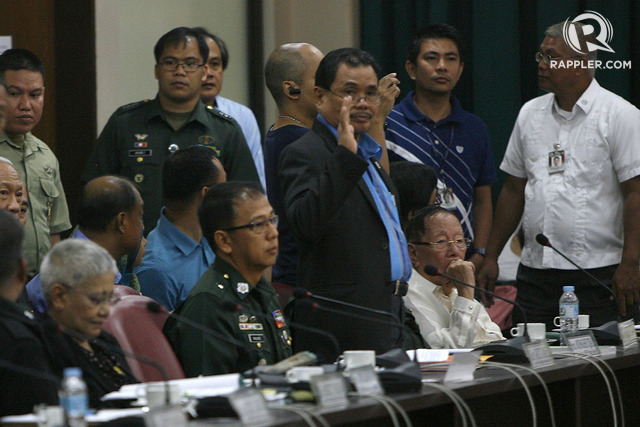Malacañang asks lawmakers to scrutinize the Bangsamoro Basic Law based on its merits, and not on the alias issue

PSEUDONYM. Malacañang defends Moro Islamic Liberation Front chief negotiator and Bangsamoro Transition Commission chairman Mohagher Iqbal's use of an alias in signing the peace agreement.
After Moro Islamic Liberation Front (MILF) chief negotiator Mohagher Iqbal admitted he had used an alias in signing a historic peace deal with the Philippine government, Malacañang came to his defense and said there was no “deception” in the act.
Deputy
Presidential Spokesperson Abigail Valte said in a news briefing on Friday,
April 10, that the government knew all along Iqbal was using an alias.
“At least on the
side of the executive, allow me to say that the real names of the MILF
negotiators are of course known to the Philippine government, and in fact, they
possess Philippine passports as issued by the DFA (Department of Foreign
Affairs),” she said.
Valte added:
"Yes, that’s quite clear. There’s no deception on their part because they
made their real names known to government."
She said in past
negotiations, negotiators from the National Democratic Front (NDF), the Moro
National Liberation Fron (MNLF), and the Cordillera People’s Liberation Army
(CPLA) "were allowed the courtesy to continue using their aliases...as a
matter of personal security.”
Malacañang also
said the Bangsamoro Basic Law (BBL), the culmination of the peace deal with the
MILF, “should be discussed on the basis of the merits of the law itself."
The
administration’s defense of Iqbal comes after Senator Ferdinand Marcos Jr
joined Davao City Representative Karlo Nograles in criticizing Iqbal's use of
an alias, saying it “mocks” and “jeopardizes” the peace process.
The controversy
over Iqbal's pseudonym started with a Facebook post of former interior
secretary Rafael Alunan III, who cited information from an anonymous source
that Iqbal and MILF chairman Al Haj Murad Ebrahim supposedly hold Malaysian
passports.
Iqbal responded
by releasing a
copy of his Philippine passport, but covered the portion showing his
real name.
Iqbal has
defended his use of various aliases, refusing to divulge his real
name. Iqbal argued that using a "nom de guerre (war name)" is common
among revolutionary groups, and even heroes.
De Lima:
Nothing wrong with alias
Justice Secretary
Leila de Lima also saw nothing wrong with Iqbal's use of an alias, and said it
is not basis to invalidate the peace agreement between the government and the
MILF which Iqbal had signed.
“I don't think it
will affect the authenticity or the very legality of the document just because
it is signed under a nom de guerre or an alias, because he has already admitted
that he used an alias. He can no longer deny such representation. The doctrine of
estoppel comes in,” she said.
The DOJ chief
added, “He is now in estoppel to deny that it is his signature that he
knowingly affixed his signature in the agreement so the validity of the
agreement cannot be considered as having been affected.
De Lima echoed
the Palace position that it is common practice for rebel leaders to use a nom
de guerre when engaging in peace negotiations as a security precaution.
“If we do not
allow them the courtesy to continue using such 'nom de guerre' whenever they
are involved in a peace process do you think that peace process would
continue?" she asked.
She said Article
178 of the Revised Penal Code, which prohibits the use of fictitious names,
only applies when the person is using an alias to commit a crime.
De Lima said the
Commission on Elections (Comelec), for example, had allowed former president
now Manila Mayor Joseph Ejercito Estrada to
use "Erap" – an alias – in his campaigns and in his votes.
The alias issue
now threatens to cloud the Senate discussion on the BBL, already imperiled by
the January 25
clash between elite cops and Moro rebels in the MILF stronghold of
Mamasapano, Maguindanao. Malacañang however, continues to push for the bill.
Peace council
'legal'
Valte also
defended the Palace-created Peace Council amid questions on its legality in the
absence of an executive order, and emphasized that no public funds will be used
for the council.
“Well, in the
first place, I don’t know why it would be illegal because it’s a private group
that is not being funded by government. They responded to the President’s call
to organize themselves, the co-convenors did, and that everything will be done
separately and independently," she said.
Valte noted that
Aquino "only tasked the two convenors and it was up to them who they would
add."
“We have no hand
in the selection; we have no hand in anything else. These community leaders and
private individuals have agreed to form this council, again, which will not
supplant Congress in any way to be able to contribute to the national
discussion on BBL.”
The council had
its first meeting on April 6.
http://www.rappler.com/nation/89523-iqbal-alias-malacanang

No comments:
Post a Comment
Note: Only a member of this blog may post a comment.